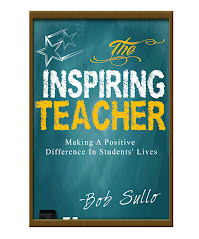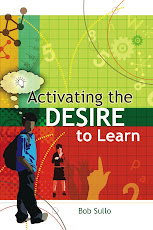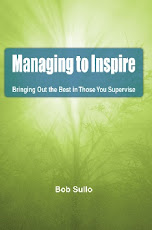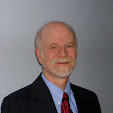Today marks the end of
“American Education Week.” It’s a
time marked by celebration and outward expression of gratitude to those who
help educate the next generation. Beneath all the good will and happy talk,
however, there remains a belief that teaching isn’t all that big a deal. Let me
give an example.
During a conversation with a friend concerning the recent
strike by Chicago teachers, he remarked, “Anyone can be a teacher.” As someone
who worked as a public school educator for 34 years and has dedicated my
professional life to education, I found the comment offensive. (Adide to all my
choice theory friends: I know my friend’s comment didn’t make me angry. I chose to be angry. It’s a choice I don’t regret. Sometimes
anger is a legitimate choice. Hence the term “righteous indignation.”)
Since then, I have given his comment a lot of thought:
“Anyone can be a teacher.” It would be one thing if the comment were made by
someone uneducated and insensitive. I could have written it off as an
understandable byproduct of ignorance.
But the comment was made by a highly educated, thoughtful, articulate,
save-the-planet, unabashed liberal. His stinging rebuke, offered
matter-of-factly and without a hint of rancor, got me thinking. Could he be
right? Can anyone be a teacher? Let’s look at what the research says:
- For
the sake of this discussion, I’m assuming a teacher has at least a
bachelor’s degree. In 2011, the percentage of people age 25 and over with a bachelor’s degree in the United States was 30.44. For the
math-challenged among you, that’s less than one-third. Hmmm.
Maybe it’s a bit of a stretch to suggest “anyone can be a teacher,” a
sentence that rolls easily off the tongues of so many. Seems like nearly
70% of the US population in 2011 lacked the qualifications for a job that
apparently “anyone can do.”
- According
to the National Center for Education Statistics, 52% of
teachers in 2007-2008 had a master’s degree or higher. By way of
comparison, slightly less than 8% of US citizens had attained a master’s
degree in 2011.
“Anyone can be a teacher.” Even though statistics show
that statement to be false, it remains a fairly common perception. There are
lots of reasons why. Among them is the fact that most people have been to
school. In fact, in the USA in 2011, almost 88% had attained a high school
diploma, something that apparently qualifies them as self-identified “experts.”
While most people pause before second-guessing their doctor, lawyer, car
mechanic, or lawn care specialist, many find it their civil duty to identify
what ails education and how best to fix it. Call it “expertise by osmosis.” Or
maybe “familiarity breeds contempt.”
“Anyone can be a teacher.” I started my educational career
as an English teacher. I genuinely enjoy language. Verbs, voice, tone, and
tense intrigue me. In thinking about the comment, “Anyone can be a teacher,” I
decided it might be more accurate to suggest “anyone can become a teacher.” While it’s still an inaccurate
statement, I can live with the notion that obtaining a certificate to teach may
be within reach for many. They can become a teacher. By that, I mean they have can secure a
job. But to be a teacher…..that’s
whole different kettle of fish. I think of the many special educators who I
have met over the years, artfully finding ways to help kids who learn
differently make connections they couldn’t make in a traditional classroom. I
think of those teachers who not only “tolerated” some of the unattractive
behavior of adolescents, but positively connected with kids who “didn’t deserve
it” during those turbulent years. I think of those who work – successfully –
with kids whose parents are unable or unwilling to give them the support that
every student deserves. While lots of people can become a teacher, it takes something special to be
a teacher.
“Anyone can be a teacher.” Despite statistics that refute
the idea that “anyone can be a teacher,” the perception persists. Railing
against its inaccuracy does little to change it. The challenge for teachers
everywhere is to convince the population at large that teaching is a profession
worthy of respect rather than derision.
Teachers need to find a way to earn the respect of my
educated, perceptive, reflective, thoughtful friend. Currently, he is
comfortable saying, “Anyone can be a teacher,” even as he attempts to soften
the blow with the rejoinder, “Some of my best friends are teachers and they are
smarter than I’ll ever be.” Individual teachers may be – indeed, many are –
respected, but the profession as a whole does not get nearly the same level of
respect as other professions, some requiring considerably less education and
skill to be effective.
The path to respect will not be easy. Teachers must act
professionally and become their own best advocates. For as long as I have been
involved in education, teachers have failed miserably in that area, in large part because they
have tried to remain above the fray. They have naively clung to a romanticized
notion that teachers are universally respected and anything that smacks of
self-promotion or PR is somehow unseemly or beneath them. Well, those days are
over. And to much of the public, teachers unions seem only interested in their
members, not the kids. To sway public perception, unions have to be seen as “standing with students and parents.”
As American Education Week draws to a close, I salute
those teachers who inspire the best in their students. They are the real job
creators we desperately need.
***
As always, if you enjoyed this and found it useful, please
send the link to your friends. Thanks.
Bob Sullo
PO Box 1336
Sandwich, MA 02563





